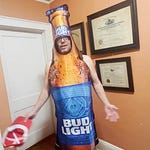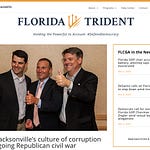Now on the street tonight the lights grow dim
The walls of my room are closing in
There's a war outside still raging
you say it ain't ours anymore to win
I want to sleep beneath peaceful skies in my lover's bed
with a wide open country in my eyes
and these romantic dreams in my headWe made a promise we swore we'd always remember
No retreat, baby, no surrender
Like soldiers in the winter's night with a vow to defend
No retreat, baby, no surrender
Bruce Springsteen was a young-ish man, 35, when he released “No Surrender” — a song seemingly about the lifetime bonds of middle-aged (or old) men on 1984’s Born in the USA. I was 12.
I never heard “No Surrender” until years later, when college friends introduced me to the Bruce songs I hadn’t heard on pop radio. A few of those friends and I saw Springsteen — along with 40,000 other people — at Camden Yards in Baltimore last weekend. My son-in-law, who is roughly Taylor Swift’s age, came along.
Taylor Swift will turn 35 in December. And it occurred to me at some point that if Bruce was born in December 1989, he would never would have become Bruce. But he might have become Taylor Swift.
I tend to turn such silly thought play into very very long essays that strangle my time and attention like subject matter ivy.
Predictably, such an article is, in fact, percolating. It concerns fights that ain’t ours any more to win, about why Bruce is the last Bruce — and why that’s fine.
Supporting details including, but not limited to: capital and technology in service of communal joy; my grandmother (and her funeral); time, of course, because thinking about time and its relation to history and future is always one of my favorite pursuits; Baltimore and New Orleans, both of which I love, and where I’ve seen 2 of my 3 Bruce shows; where and how white lib men fit into those cities and a country and world pretty done with us at the moment; friendship; manhood, in its relationship to women; stadiums and the really great song ‘Wrecking Ball,” — Bruce’s, not Miley’s (although Miley’s kinda kills, too); the unraveling of college football (and why that’s also fine); death; and the gift of genuinely loving things and people in life, the gift of giving a shit, the gift of unabashedly caring about fights that ain’t ours any more to win.
That’s a snapshot of how my addled, compulsively connective, brain works. All that stuff — and more — tangles in itself for me. It’s a testament to Bruce’s performative power at age 74.
To be blunt, this show was way better than I expected in basically every way. Because Bruce is the last Bruce, people project onto him the sort of lyrical, institutional, occasionally eye-rolling self-serious encomia they used to project onto baseball.
But Bruce is not a Ken Burns documentary yet. He proved that all night in Baltimore, for three unrelenting hours of awesome. Here’s the set list. 29 songs. I find myself coming back to “Wrecking Ball” and “No Surrender” as my favorite moments, which I find personally fascinating.
So, I may or may not produce this absurdly indulgent essay at some point in the future. But I certainly cannot do it before I light out with my lover for a couple weeks to the peaceful skies, wide open county, and romantic dreams of Yellowstone and Grand Teton.
See you when we get back.












Share this post